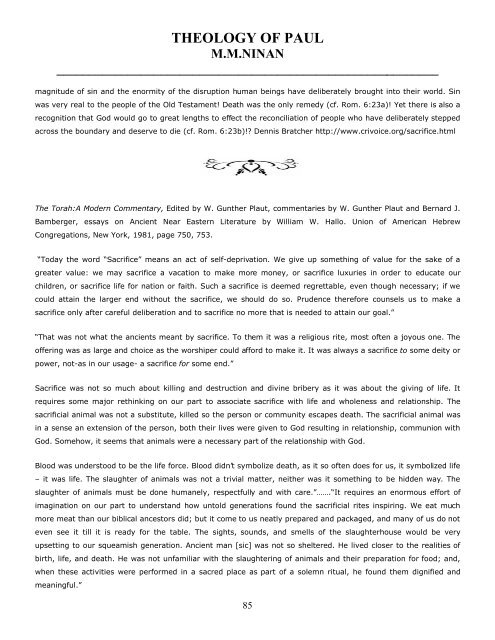Theology Of Paul
Create successful ePaper yourself
Turn your PDF publications into a flip-book with our unique Google optimized e-Paper software.
THEOLOGY OF PAUL<br />
M.M.NINAN<br />
___________________________________________________________<br />
magnitude of sin and the enormity of the disruption human beings have deliberately brought into their world. Sin<br />
was very real to the people of the Old Testament! Death was the only remedy (cf. Rom. 6:23a)! Yet there is also a<br />
recognition that God would go to great lengths to effect the reconciliation of people who have deliberately stepped<br />
across the boundary and deserve to die (cf. Rom. 6:23b)!? Dennis Bratcher http://www.crivoice.org/sacrifice.html<br />
The Torah:A Modern Commentary, Edited by W. Gunther Plaut, commentaries by W. Gunther Plaut and Bernard J.<br />
Bamberger, essays on Ancient Near Eastern Literature by William W. Hallo. Union of American Hebrew<br />
Congregations, New York, 1981, page 750, 753.<br />
“Today the word “Sacrifice” means an act of self-deprivation. We give up something of value for the sake of a<br />
greater value: we may sacrifice a vacation to make more money, or sacrifice luxuries in order to educate our<br />
children, or sacrifice life for nation or faith. Such a sacrifice is deemed regrettable, even though necessary; if we<br />
could attain the larger end without the sacrifice, we should do so. Prudence therefore counsels us to make a<br />
sacrifice only after careful deliberation and to sacrifice no more that is needed to attain our goal.”<br />
“That was not what the ancients meant by sacrifice. To them it was a religious rite, most often a joyous one. The<br />
offering was as large and choice as the worshiper could afford to make it. It was always a sacrifice to some deity or<br />
power, not-as in our usage- a sacrifice for some end.”<br />
Sacrifice was not so much about killing and destruction and divine bribery as it was about the giving of life. It<br />
requires some major rethinking on our part to associate sacrifice with life and wholeness and relationship. The<br />
sacrificial animal was not a substitute, killed so the person or community escapes death. The sacrificial animal was<br />
in a sense an extension of the person, both their lives were given to God resulting in relationship, communion with<br />
God. Somehow, it seems that animals were a necessary part of the relationship with God.<br />
Blood was understood to be the life force. Blood didn’t symbolize death, as it so often does for us, it symbolized life<br />
– it was life. The slaughter of animals was not a trivial matter, neither was it something to be hidden way. The<br />
slaughter of animals must be done humanely, respectfully and with care.”…….“It requires an enormous effort of<br />
imagination on our part to understand how untold generations found the sacrificial rites inspiring. We eat much<br />
more meat than our biblical ancestors did; but it come to us neatly prepared and packaged, and many of us do not<br />
even see it till it is ready for the table. The sights, sounds, and smells of the slaughterhouse would be very<br />
upsetting to our squeamish generation. Ancient man [sic] was not so sheltered. He lived closer to the realities of<br />
birth, life, and death. He was not unfamiliar with the slaughtering of animals and their preparation for food; and,<br />
when these activities were performed in a sacred place as part of a solemn ritual, he found them dignified and<br />
meaningful.”<br />
85


















